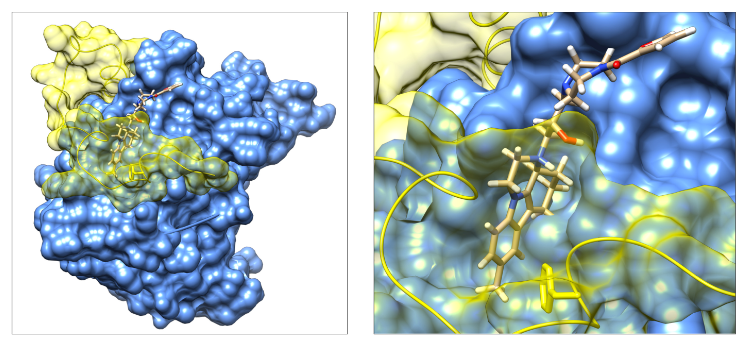Dr Mark Bond
Dr Bond’s group has an interest in the role of the cAMP signalling pathway, establishing that the growth inhibitory properties of cAMP in vascular cells are mediated via two cAMP-sensitive proteins, namely, PKA and EPAC. These act together to inhibit the activity of members of the Rho GTPases, which control actin cytoskeleton organisation. He demonstrated that disruption of actin polymerisation was a key step in cAMP-mediated growth arrest. His research linked these changes in the actin to regulation of genes needed for cell proliferation, demonstrating a key role for two key transcription factor complexes, MKL-SRF and YAP-TEAD in this. Using in silico molecular modelling his group developed a novel pharmacological YAP-TEAD inhibitor that represents a lead compound for the development of new anti-mitogenic therapies.
Current research focusses on how actin sensitive mechanisms regulate cell behaviour during several pathological processes that underly cardiovascular disease. These include sensing changes in cardiac tissue stiffness and regulating cardiac fibrosis and how actin can translocate into the nucleus and control expression of genes that promote vascular calcification.

Are you interested in a fully funded PhD?
A PhD project is available to study the role of age-related vascular stiffening in promoting vascular inflammation.
Chronic inflammation is a major factor in the initiation and progression of many cardiovascular pathologies, including atherosclerosis, abdominal aortic aneurysms, and pulmonary artery hypertension. Together, these diseases cause an estimated 17 million deaths globally, each year. The walls of large arteries, become progressively stiffer as we age. This occurs due to gradual fragmentation and loss of elastin fibres, accumulation of collagen fibres and increased crosslinking of extracellular matrix (ECM) proteins. Increased large artery stiffness, as assessed by the aortic pulse wave velocity (PWV) independently predicts cardiovascular risk and is associated with elevated levels of inflammatory markers. We will test the hypothesis that increased vascular stiffness promotes pro-inflammatory gene expression in vascular smooth muscle cells (VSMC). Our preliminary data indicates that ECM stiffness modulates levels of actin monomer and Lamin-A within the nucleus. Our previous data also demonstrates a role of nuclear actin in the regulation of NF-kB and inflammatory gene expression. The project will employ a wide range of cell and molecular biology techniques to highlight the potentially important role played by vascular stiffness in promoting vascular inflammation and characterise the underlying mechanisms.
This project proposal will be submitted to the BHF with you as the named student. Funding will be subject to the normal BHF review process and typically will take 3 – 6 months. The studentship is available to anyone who is eligible for University of Bristol home fees (i.e U.K./E.U.). If successful, the studentship will come with a student stipend at the standard BHF rates (i.e. £19,919 - £23,298)
Applicants should have at least a 2:1 BSc in a relevant biological subject and ideally an MSc. For further information please contact Mark Bond.
